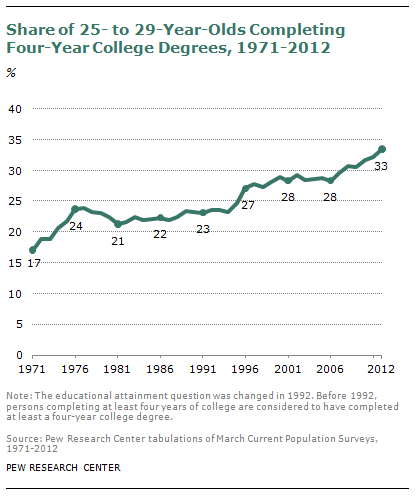
Completion of four-year college degrees is up sharply in the past five years among the nation’s young adults. In 2012 a record one-third of adults ages 25 to 29 have attained at least a bachelor’s degree. As recently as 2006 fewer than 30% of 25- to 29-year-olds had finished at least a bachelor’s degree.
Record levels of bachelor’s degree attainment in 2012 are apparent for most basic demographic groups.
The Public’s Views on the Importance of Higher Education
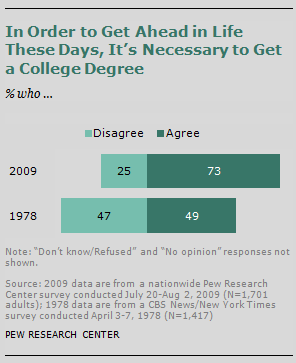
These trends in educational attainment reflect the growing importance the American public places on a college education. In a July 2009 Pew Research Center survey, 73% of adults agreed with the following statement: In order to get ahead in life these days, it’s necessary to get a college education. When CBS News and The New York Times asked the same question in 1978, only 49% of adults agreed.
A December 2009 survey by the Public Agenda Foundation asked more specifically about the link between a college degree and career success. A narrow majority (55%) said a college education is necessary to be successful in today’s work world, while 43% said there are many ways to succeed in today’s work world without a college education. Ten years earlier, the balance of opinion had been much different. In 1999, only 31% of adults said a college education is necessary to succeed in the work world, while 67% said there are many ways to succeed without a college degree.
Other survey questions reveal a similar evolution of opinion. In June 2010, the Gallup Organization asked how important a college education is today. Fully three-quarters of adults said a college education is “very important.” When Gallup asked the same question in 1978, only 36% said a college education was very important.
In spite of these trends, the public remains of two minds about the value of college. On the one hand, strong majorities say a college education is important. On the other hand, many question the value of college given the rising costs. In a March 2011 Pew Research survey, 57% of adults said the higher education system in the U.S. fails to provide students with good value for the money they and their families spend.
By Gender
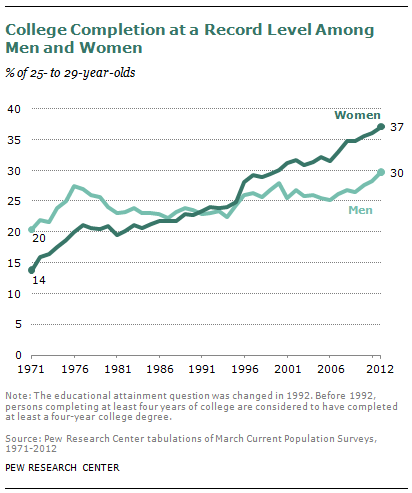
In 2012, record levels of both young men and young women had finished college. The widely observed stagnation in male attainment (Dynarski, 2007) has at least temporarily receded as 30% of men ages 25 to 29 had finished college in 2012. In 2011 28% of men in this age group had finished at least a bachelor’s degree, the same level of male attainment recorded in 1976.1
By contrast, women’s educational levels have grown steadily over the past 40 years and by 2012 reached their highest level at 37% completing at least a bachelor’s degree.
By Race and Ethnicity
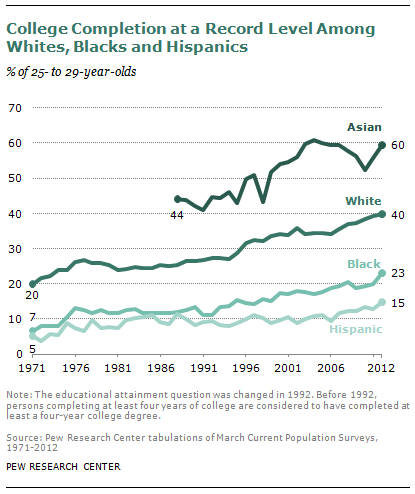
College attainment reached a record level in 2012 among most of the major racial and ethnic groups in the U.S. Among whites ages 25 to 29, 40% had completed at least a bachelor’s degree in 2012, up from 39% in 2011 and 20% in 1971. Blacks and Hispanics were much less likely than whites to have finished at least a bachelor’s degree in 2012, but their levels of college attainment also reached unprecedented levels. In 2012 23% of blacks ages 25 to 29 had completed at least a bachelor’s degree, an increase from 20% in 2011. Bachelor’s degree attainment among young Hispanics increased to 15% in 2012, up from 13% in 2011. College completion among Asians ages 25 to 29 remained far above other groups in 2012 (60%), but this level was below the level observed among Asians in 2004 (61%).
Rising college completion rates within racial and ethnic groups of young adults suggest that changing demographics in the U.S. are not inhibiting an overall increase in educational attainment. Some scholars have surmised that the increasing share of minorities among the young adult population would result in a “plateau in educational attainment.” This projection raised doubts about the ability of the country to further increase educational attainment in the face of growing minority populations (Kodrzycki, 2002; Ellwood, 2002; Gordon, 2012).
Blacks and Hispanics, on average, have lower levels of college attainment. The Hispanic population, in particular, is a growing share of the population. In March 1988 more than three-quarters of adults ages 25 to 29 were white or Asian. By March 2012 the share of adults ages 25 to 29 that was white or Asian was less than two-thirds. Absent increases in educational attainment within racial and ethnic groups, this “demographic headwind” would be expected to dampen further increases in educational attainment. But the envisioned plateau or decline in the overall attainment of the nation’s young adults has not materialized in part because collegiate attainment has increased among black and Hispanic young adults.
By Nativity
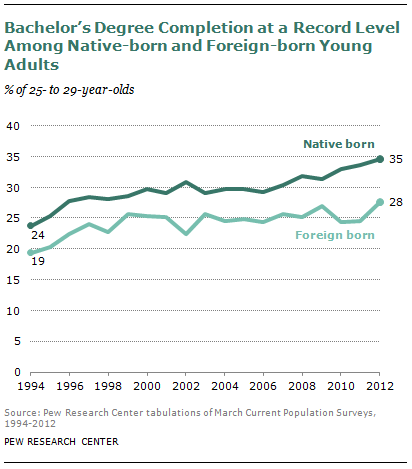
Trends in bachelor’s degree attainment by nativity are available back to 1994. Among native-born 25- to 29-year-olds, collegiate attainment reached a record high in 2012 (35%). Among immigrant young adults, a record 28% have at least finished a bachelor’s degree in 2012, eclipsing the prior high of 27% observed in 2009. Some of the increase in the educational attainment of foreign-born 25- to 29-year-olds may reflect changes in the source countries of recent immigrants to the United States. Immigrants from Asia have recently eclipsed Hispanic immigrants as the largest source of new immigrants to the United States (Pew Research Center, 2012).




